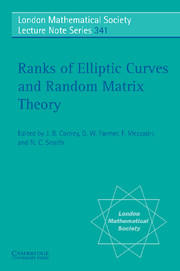Book contents
- Frontmatter
- Contents
- Introduction
- FAMILIES
- Elliptic curves, rank in families and random matrices
- Modeling families of L-functions
- Analytic number theory and ranks of elliptic curves
- The derivative of SO(2N +1) characteristic polynomials and rank 3 elliptic curves
- Function fields and random matrices
- Some applications of symmetric functions theory in random matrix theory
- RANKS OF QUADRATIC TWISTS
- NUMBER FIELDS AND HIGHER TWISTS
- SHIMURA CORRESPONDENCE, AND TWISTS
- GLOBAL STRUCTURE: SHA AND DESCENT
- Index
Analytic number theory and ranks of elliptic curves
Published online by Cambridge University Press: 10 November 2010
- Frontmatter
- Contents
- Introduction
- FAMILIES
- Elliptic curves, rank in families and random matrices
- Modeling families of L-functions
- Analytic number theory and ranks of elliptic curves
- The derivative of SO(2N +1) characteristic polynomials and rank 3 elliptic curves
- Function fields and random matrices
- Some applications of symmetric functions theory in random matrix theory
- RANKS OF QUADRATIC TWISTS
- NUMBER FIELDS AND HIGHER TWISTS
- SHIMURA CORRESPONDENCE, AND TWISTS
- GLOBAL STRUCTURE: SHA AND DESCENT
- Index
Summary
Abstract
We discuss recent applications of analytic number theory to the study of ranks of elliptic curves.
Introduction
This article is meant to be a sampling of techniques and interesting results on the (analytic) ranks of elliptic curves. The main result discussed is an upper bound on the average rank of the family of all elliptic curves. The bound obtained is less than 2, which implies (by work of Kolyvagin) that a positive proportion of elliptic curves have finite Tate-Shafarevich group and algebraic rank equal to analytic rank. The synergy here between algebraic and analytic methods is extremely pleasant.
We also discuss the problem of showing that a large number of elliptic curve L-functions do not vanish at the central point. Many of the techniques used in bounding the average rank are useful in this direction.
Our exposition is meant to be somewhat colloquial. The interested reader should consult [Y1] and [Y2] for all technical details.
In this volume E. Kowalski has given a broad overview of what is known on ranks of elliptic curves in families. We shall refer to his article for general background knowledge on elliptic curves. We have attempted to minimize overlap with his article without loss of coherence of this paper.
We shall assume the Generalized Riemann Hypothesis throughout this article.
Acknowledgements
I would like to thank Henryk Iwaniec for supporting my last-minute decision to attend the workshops. I also thank the organizers of the Newton Institute program for inviting me to attend.
- Type
- Chapter
- Information
- Ranks of Elliptic Curves and Random Matrix Theory , pp. 71 - 92Publisher: Cambridge University PressPrint publication year: 2007



